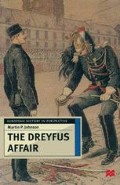Abstract
There have been moments when one individual has reshaped destiny’s patterns. In mid-January 1898 the case of the bordereau was over. Dreyfus had been convicted and Esterhazy acquitted. Picquart was arrested, Scheurer-Kestner defeated. Then Zola — that deeply flawed egotist with his novelist’s sense of the dramatic — transformed the landscape. ‘Mr President’, he wrote to Faure in L’Aurore on 13 January,
I accuse Lieutenant-Colonel du Paty de Clam of having been the diabolical agent of a judicial error…
I accuse General Mercier of having made himself an accomplice…
I accuse General Billot of having had in his hands absolute proof that Dreyfus was innocent and of having suppressed it…
I accuse General Boisdeffre and General Gonse of making themselves accomplices to the same crime…
I accuse General de Pellieux and Commandant Ravary of having conducted a villainous inquiry…
I accuse the Ministry of War of having led an abominable press campaign…
I accuse, finally, the first court martial of having violated the law by condemning a suspect on the basis of a document unknown to him, and I accuse the second court of having covered up this illegality under orders by committing in its turn the judicial crime of knowingly acquitting a guilty man.
The Dreyfus Affair is now a religion, the religion of justice and truth.1
Preview
Unable to display preview. Download preview PDF.
Notes
Stephen Wilson (1973) ‘The Anti-Semitic Riots of 1898 in France’, Historical Journal 16(4): 789–806,Ideology and Experience Anti-Semitism in France at the Time of the Dreyfus Affair (Rutherford, New Jersey: Fairleigh Dickinson University Press, 1982); Eugen Weber, ‘Reflections on the Jews in France’, in Malino and Wasserstein, The Jews in Modern. France, 8–27;
Nancy Fitch (1992) ‘Mass Culture, Mass Parliamentary Politics, and Modern Anti-Semitism: The Dreyfus Affair in Rural France’, American Historical Review, 97 (6): 55–95.
Michael Burns, Rural Society and French Politics: Boulangism and the Dreyfus Affair (Princeton: Princeton University Press, 1984), 137;
Jocelyn George, ‘Provinciales: la France des quatre coins’, in La France de L’Affaire Dreyfus, ed. Pierre Birnbaum (Paris: Gallimard, 1994).
Jeremy Jennings, ed., Intellectuals in Twentieth-Century France: Mandarins and Samurais (New York: St Martin’s Press, 1993), 44.
Christophe Charle, ‘Champ littéraire et champ du pouvoir: Les Ecrivains et l’Affaire Dreyfus’, Annales ESC (March-April 1977), 245, and La Naissance des ‘intellectuels’, 1880–1900 (Paris: Editions de Minuit, 1990); Phillip Cate, ‘The Paris Cry: Graphic Artists and the Dreyfus Affair’, in Kleeblatt, The Dreyfus Affair.
Author information
Authors and Affiliations
Copyright information
© 1999 Martin P Johnson
About this chapter
Cite this chapter
Johnson, M.P. (1999). The Grand Affaire (1898). In: The Dreyfus Affair. European History in Perspective. Palgrave, London. https://doi.org/10.1007/978-1-349-27519-9_5
Download citation
DOI: https://doi.org/10.1007/978-1-349-27519-9_5
Publisher Name: Palgrave, London
Print ISBN: 978-0-333-68267-8
Online ISBN: 978-1-349-27519-9
eBook Packages: Palgrave History CollectionHistory (R0)

